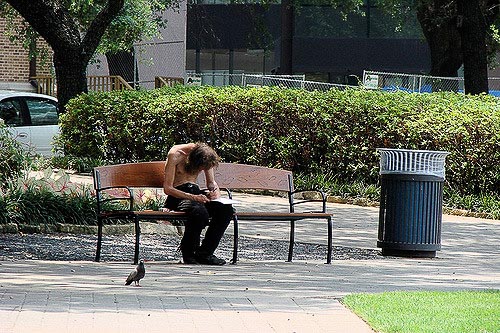Houston Mayor Sylvester Turner announced his plan to expedite efforts to permanently house the homeless population in Houston amid a flock of faith leaders, city officials and law enforcement officers.
The plan calls for an expansion of The Way Home, a collaborative group that includes local governments, school districts and nonprofits, created in 2012 with the goal of preventing and ending homelessness in Harris and Fort Bend counties. Turner called for increasing the number of beds in the regional shelter system and restricting encampments like "tent cities" by city ordinance.
The plan will also include an anti-panhandling awareness campaign, increased collaboration with "charitable feeding groups" and a push for mental health and substance abuse resources.
"I am committed to doing even more," Turner said. “It is simply not acceptable for people to live on the streets; it is not good for them, and it is not good for the city."
"We will tackle this complicated issue, and we will do it humanely with a meaningful approach that balances the needs of the homeless and the concerns of neighborhoods they impact."
The Way Home initiative has already reduced overall homelessness in the Houston area by 57 percent over the past five years, according to the Coalition for the Homeless. Turner's plan would help take an additional 500 "chronically homeless" people off the streets and into "permanent, supportive housing" in the next six months.
"The old way of thinking used to be that homeless individuals needed to get their lives in order before anything else," said Sara Brown, communications manager for the Coalition for the Homeless Houston, in an interview.
Previously, social service agencies often required the homeless to get sober and get jobs before being considered for housing. Now, the approach is to provide the homeless with housing at the onset, which can provide the foundation for improvement in other areas of their lives.
"As homeless providers, we don't need to reinvent the wheel," Brown said. "We just need to make sure that homeless individuals don't get lost in the shuffle, so collaboration is key."
Temporary outdoor shelters will be built under overpasses and on private property to help accommodate those who might be displaced by new ordinances relating to the plan, Turner said. The shelters will be professionally staffed and covered.
As of right now, Turner says there aren’t any cost estimates for the project, including the professional staffing of those shelters.
"This is a realistic, holistic approach that provides meaningful solutions," Turner said. "By offering multiple choices and a little bit of tough love, we hope to convince more of our street population to get off the streets."

